SPOTLIGHT
Covid-19 precautions have as good as fallen away in townships like Khayelitsha
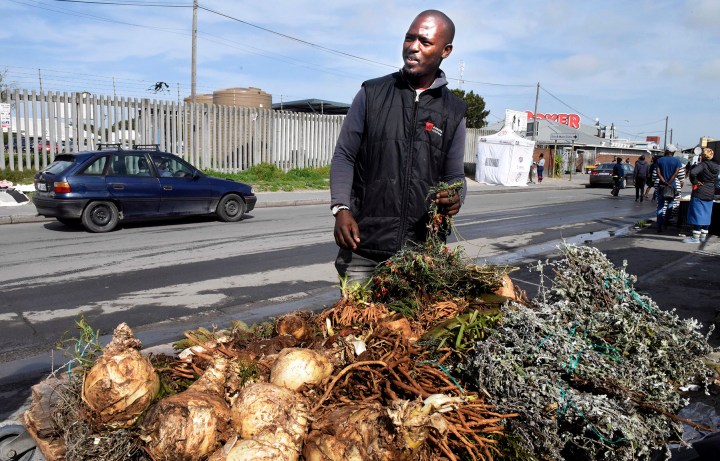
Despite authorities warning against complacency, residents in places such as Khayelitsha in Cape Town are not just more relaxed under lockdown Level 2, but many are abandoning Covid-19 safety precautions altogether.
Spine Road off the N2 highway leading to Khayelitsha is a hive of activity. It’s a sunny Friday morning and Cape Town’s biggest township is coming to life.
Women in nightgowns sit in groups while others hang up the washing. Further down the road, shisanyama spots buzz with activity as patrons queue for their daily supply of braai meat.
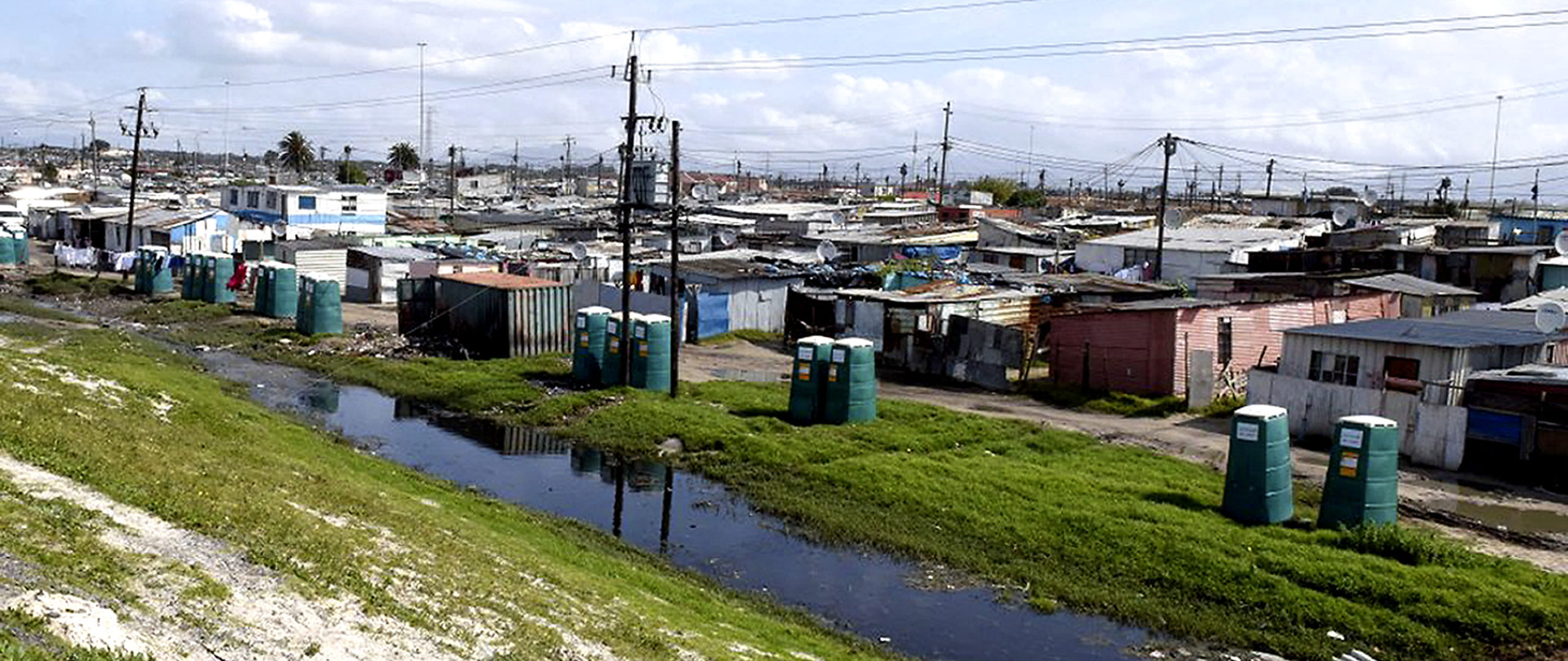
By Monday (14 September) there were only 45 confirmed active Covid-19 cases in the Khayelitsha. (Photo: Nasief Manie / Spotlight)
South Africa’s Covid-19 lockdown was relaxed to Level 2 (of five) on 18 August. But even as the economy opens up, health authorities continue to stress the importance of measures such as wearing masks, washing hands and physical distancing.
Yet, in Khayelitsha, few people wear masks and there is little sign of physical distancing.
“Siyinqobile iCovid (We have defeated Covid-19),” a man tells us before disappearing into the sea of shacks alongside the road.
A hard-hit township
Up until 14 September, 8,333 confirmed cases of Covid-19 had been reported in Khayelitsha, which amounts to about 10% of Cape Town’s total cases. As elsewhere, however, the real number of infections is probably much higher.
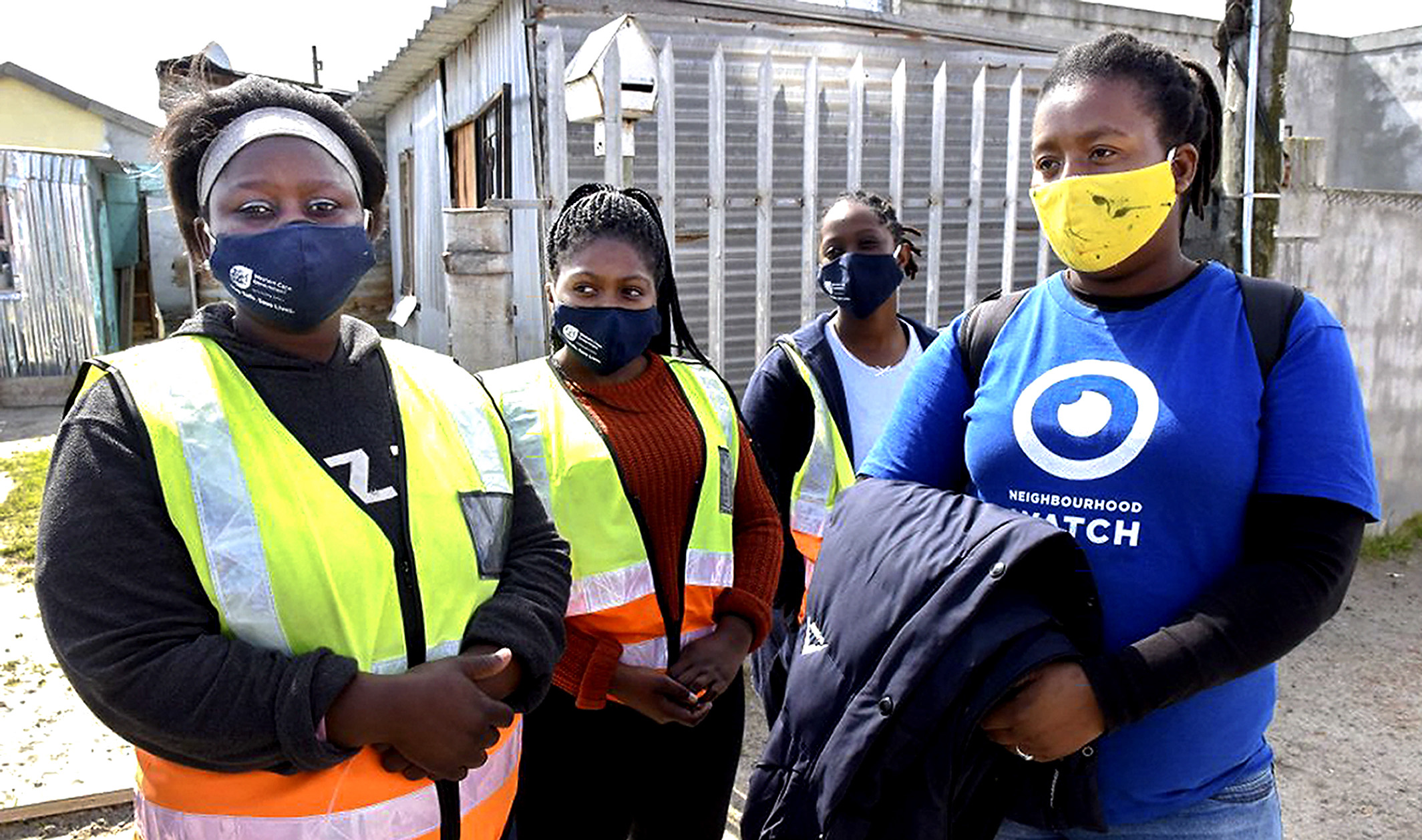
Nolubabalo Mcondobi, left, Sisipho Libaya Yonela Nolongeni and Siziphiwe Mbembe work as volunteers at the Mathew Goniwe Clinic and help to enforce physical distancing.( Photo: Nasief Manie/Spotlight)
In a recent Covid-19 antibody survey, more than 40% of HIV patients and pregnant women in the township whose blood samples were tested, showed SARS-CoV-2 antibodies. Even if just 20% of Khayelitsha’s population has been infected, the real number would be multiple times higher than the official count.
A sense that the initial wave of infections has subsided was reinforced on 12 August when Western Cape Premier Alan Winde announced the closure of the Khayelitsha Thusong Centre (a temporary Covid-19 facility).
By Monday 14 September, there were only 45 confirmed active cases in the area.
Risk still ‘high’
Meanwhile, queues at the Khayelitsha community health clinic are a lot shorter than they were before the virus first hit the township.
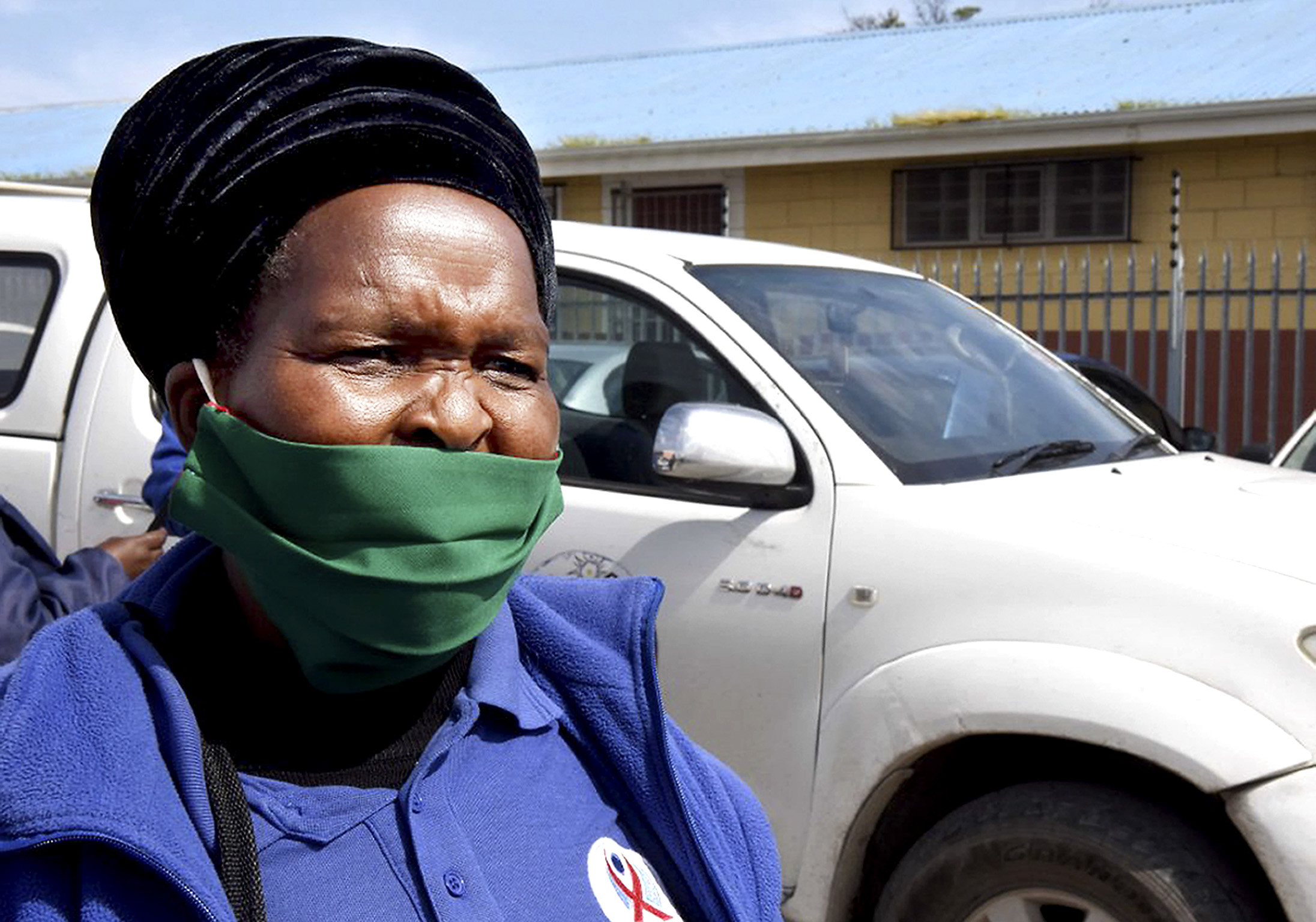
Thandeka Vayeka works for TB/HIV Care in the Makhaza community in Khayelitsha. (Photo: Nasief Manie / Spotlight)
Mziwonke Dlulane, 43, is waiting to be screened for Covid-19. The father of three stays in the densely populated TR informal settlement. He tells Spotlight that he believes the risk of contracting the virus is still high.
A few days ago, Dlulane attended a funeral in the Eastern Cape and says his concerned wife urged him to get tested.
“Despite telling her that I’m fine and not showing any symptoms, she insisted I come,” Dlulane says. “We live in communities where people still don’t adhere to the rules. I always wear a mask, but some of my neighbours mock me about it. They ask ‘why are you suffocating yourself with that thing in this scorching heat?’ ”
Another resident, Babalwa Ntoyanto, 39, says she was accompanying a friend who was collecting her chronic medication and decided to get screened for Covid-19.
“I am absolutely fine because I stay indoors and avoid places where there are big crowds. Some of us are still scared of contracting this virus because we know of people who died from it,” says Ntoyanto.
Slowing down
Thokoza Mdunyelwa and Nolufefe Mbi, both community healthcare workers, say they have been doing Covid-19 screenings during lockdown, but that things had slowed down since the start of Level 2. From screening over 100 people a day during the stricter lockdown levels, they say they now screen about 30 a day.
“People here in Khayelitsha think this virus is over. The fact that we are now on Level 2 and shebeens are open makes people think we are fine. They don’t see the need to be screened… they take this virus as a joke,” says Mbi.
She contracted the virus during lockdown Level 4 and considers herself lucky to have survived.
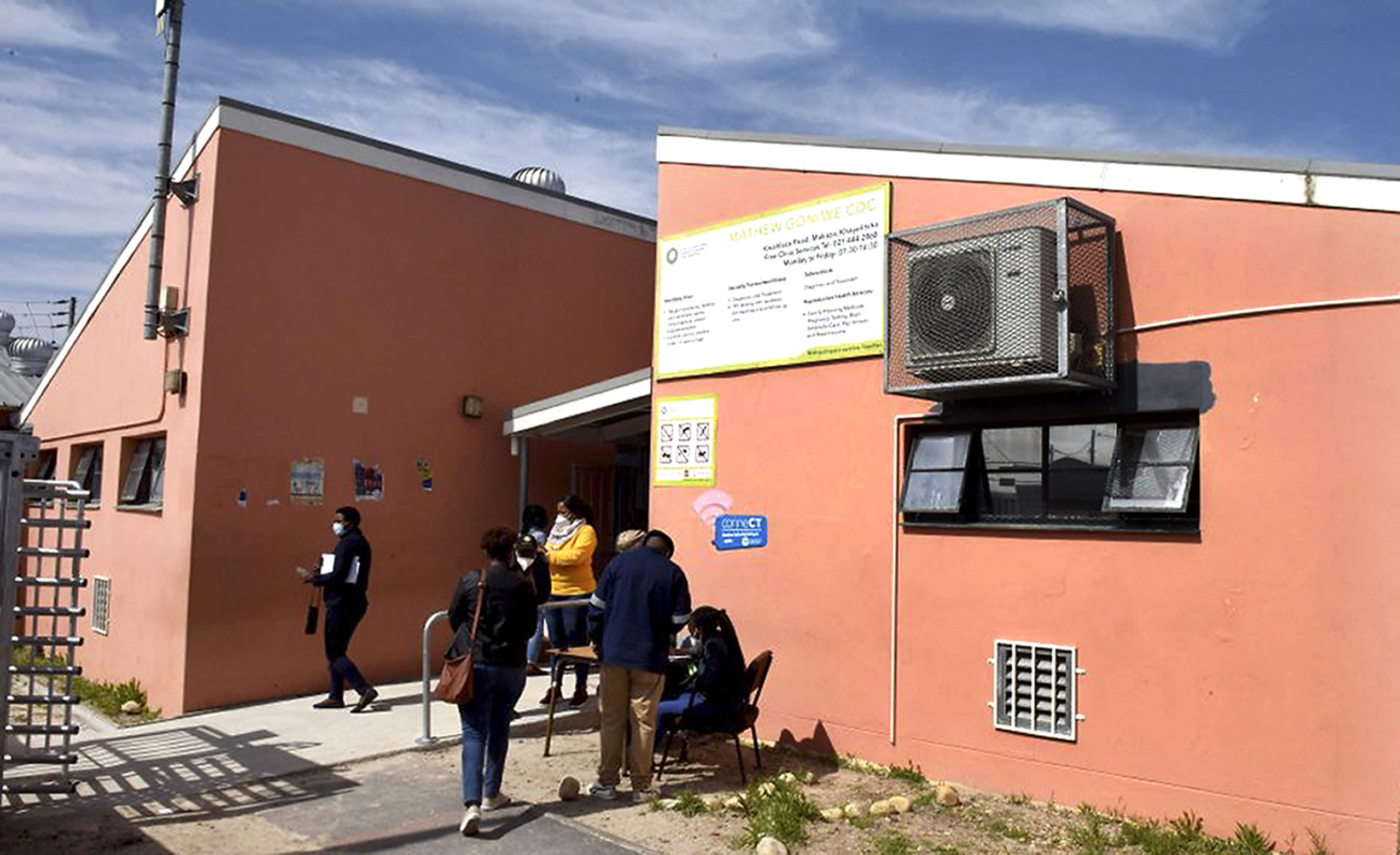
From screening more than 100 people a day during the stricter lockdown levels, community health workers say they now screen about 30 residents a day. (Photo: Nasief Manie / Spotlight)
“I showed some symptoms and immediately decided to go for a test on 29 June. Mbi said she isolated at home after testing positive, adding that the past six months had been stressful for frontline workers like herself.
“Every day you live in fear of contracting the virus and infecting your family. I’ve been to hell and back, but we have to soldier on,” says Mbi.
Besides the low salaries, long hours and not feeling appreciated, Mdunyelwa says they also have to put up with occasional abuse from residents now that some community healthcare workers are making house calls. She says now that they are screening fewer people for Covid-19, they are once again focusing on HIV testing and TB contact and defaulter tracing.
The two women say some residents of Khayelitsha, especially the elderly, are still adhering to the rules.
“We emphasise that they are vulnerable to the virus, but they are highly disciplined. They are the ones who keep us on our toes, asking questions about the virus and ways to keep themselves safe,” Mdunyelwa says.
Promising signs
Premier Alan Winde recently noted that three weeks into Level 2, with more businesses open, more people returning to work and more people moving around, there has not been an uptick in new cases.
“With the appropriate safety measures in place, we can reopen further and save jobs while also saving lives,” Winde wrote in his weekly Covid-19 update.
“There are, as yet, no tools that can indicate whether we will see a resurgence in the virus, or when.
“In the absence of a vaccine, behaviour change is the most powerful weapon that we have against Covid-19,” he says.
But is the Western Cape succeeding in its efforts to get people to change their behaviour, given the apparent rejection of masks and physical distancing in much of Khayelitsha?
Cayla Murray from the provincial health department says their information on compliance with mask-wearing is anecdotal at present.
“But it is a concern that people have become more complacent,” she tells Spotlight.
“The Western Cape department of community safety, in collaboration with the health department and the University of Stellenbosch, is looking to undertake a small-scale study in Khayelitsha and the broader eastern health sub-district soon, to determine the percentage of people wearing masks.
“The study will likely be conducted over a few months to measure whether the wearing of masks decreases over time with any further changes in Covid-19 levels,” says Murray.
New informal settlements
Meanwhile, as authorities put up Covid-19 awareness billboards, defiant residents continue to erect shacks in open spaces in Khayelitsha, despite attempts by the City of Cape Town to demolish the structures. Some of these new settlements are named after the buzzwords of the pandemic, like “Sanitiser” and “Corona’”.
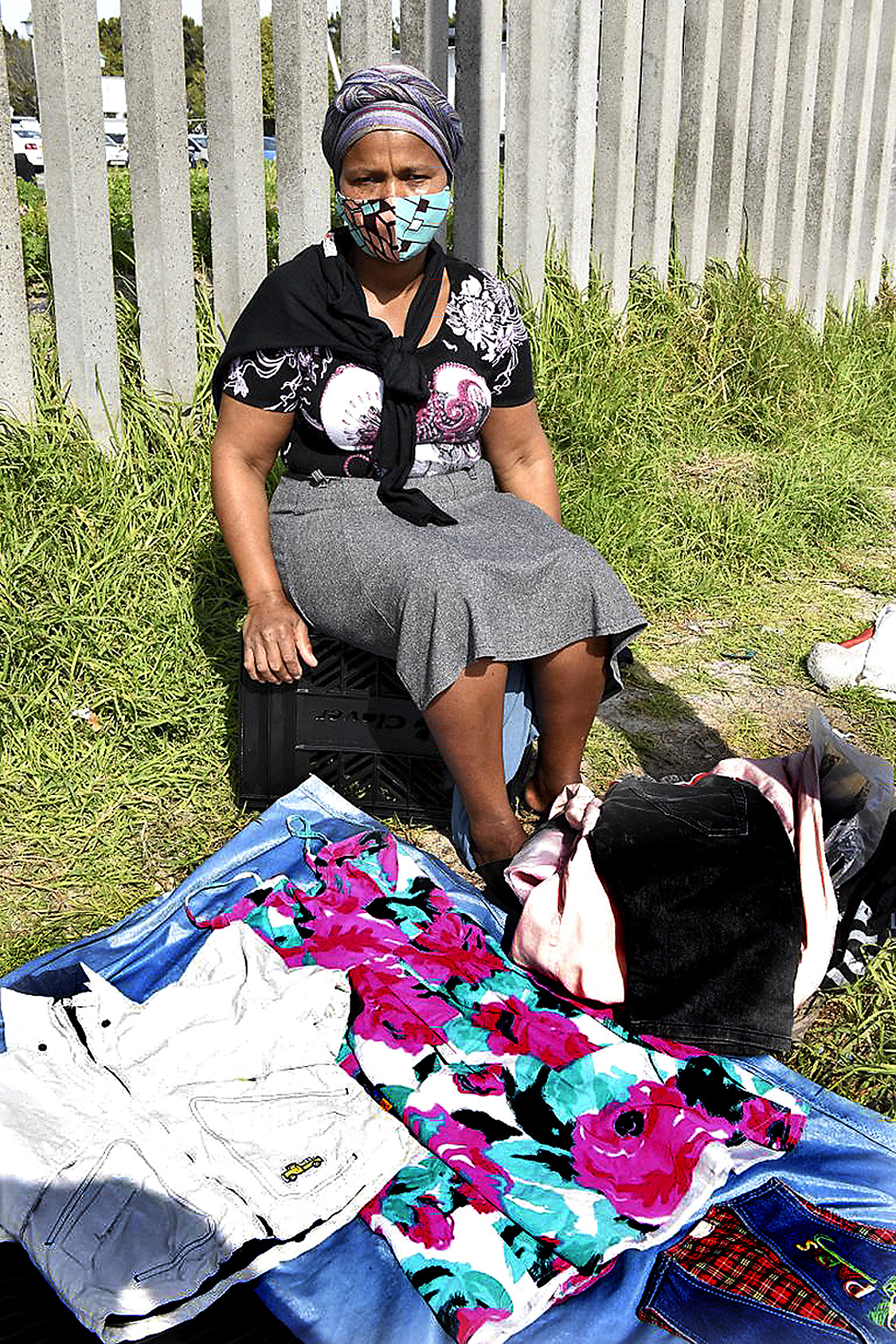
Khayelitsha resident Thobeka Ncwaba is grateful for the R350 social relief grant provided by the government, but says her business as a second-hand clothing seller has suffered since the outbreak of the pandemic. (Photo: Nasief Manie / Spotlight)
“It sometimes skips our minds that we have to adhere to these rules when we hear on the radio that the cases have dropped,” says 53-year-old Thobeka Ncwaba, a mother of seven who lives in a two-roomed shack in the newly established “Covid-19” informal settlement alongside the N2 highway running past Khayelitsha.
“We are living in a poor community. The one thing that occupies our mind is providing a meal for our families.”
Hailing from Idutywa in the Eastern Cape, Ncwaba says if there is anything that would put a smile on her face, it would be getting a decent roof over her head.
“We are dying every day here… not only from Covid-19, but from shack fires. I had to move to this open space after my shack burnt down. We have no option but to occupy these open spaces because we have no place to stay,” she says.
With shacks built close to each other, Ncwaba admits that physical distancing and washing hands are impossible in the new informal settlements.
“That is why we, as informal settlement dwellers, are most at risk of this virus. Every day I count myself lucky that my children and I don’t show symptoms,” she says.
To eke out a living, Ncwaba sells second-hand clothing in Khayelitsha. She says business has been tough since Covid-19 struck.
Ncwaba says she doesn’t know how she would have survived had it not been for the R350 social relief grant from the government. She is among thousands of beneficiaries fortunate enough to have received the grant. Social Development Minister Lindiwe Zulu, in answer to a parliamentary question, said that by 19 August the “number of approved grant applications stood at 4,424,720”.
Many eligible beneficiaries, however, have not been as fortunate and were either rejected or are still waiting. The Auditor-General recently flagged the grants process, saying that “some applicants could have been unfairly rejected as a result of outdated information on which assessment for eligibility was based”.
“It’s too little (the grant), but what can we say? We are starving and anything that puts food in our mouths is appreciated. During Level 5 I was fortunate to get food parcels from some Good Samaritan (an organisation) white people. But ever since then, nothing has been forthcoming,” Ncwaba says.
Media reports indicated that large numbers of people eligible for government food parcels did not receive them, so civil society organisations had to step in. According to official figures, by 11 May, when the distribution of food parcels ended, 146,936 parcels had been sent out.
Keeping the wolf from the door
A stone’s throw from Ncwaba, 36-year-old Lubabalo Putswana, an informal trader, sells traditional herbs. He says it is on this income that his family must survive. Ever since Covid-19 struck, business has been bad, Putswana says.
He sells traditional herbs such as impepho (a type of incense) and umhlonyane and says under the stricter lockdown regulations he wasn’t able to sell his stock. Putswana is, however, quick to stress that umhlonyane, contrary to popular belief, does not cure Covid-19.
But many of the customers who flock to his stand believe otherwise.
One woman, Nosakhele Vukubi, 45, says she uses traditional herbs for flu symptoms because it is cheaper than going to the doctor.
Putswana says he always encourages his customers to follow the regulations and go for screening. The father of three was among the beneficiaries who received the R350 government social relief grant and says although it is not enough, he manages to keep “the wolf from the door”.
Healthcare worker challenges
According to Mzwanya Ndibongo, chairperson of the Khayelitsha Health Forum, there are seven health facilities servicing the area, including clinics, day hospitals and a district hospital.
Ndibongo says during lockdown, they noted one of the busiest clinics in Site C, Nolungile clinic, had 20 healthcare workers testing positive for Covid-19. A nurse at the clinic succumbed to the virus.
“We sit in forums discussing these ongoing challenges and we hope that solutions will be found soon. Healthcare workers play a vital role in the fight against this pandemic, and everything needs to be done to ensure that their morale is high. They work under extreme conditions and we owe it to them to ensure that their working conditions are improved. These are people who put their lives at risk and they deserve better treatment,” he says.
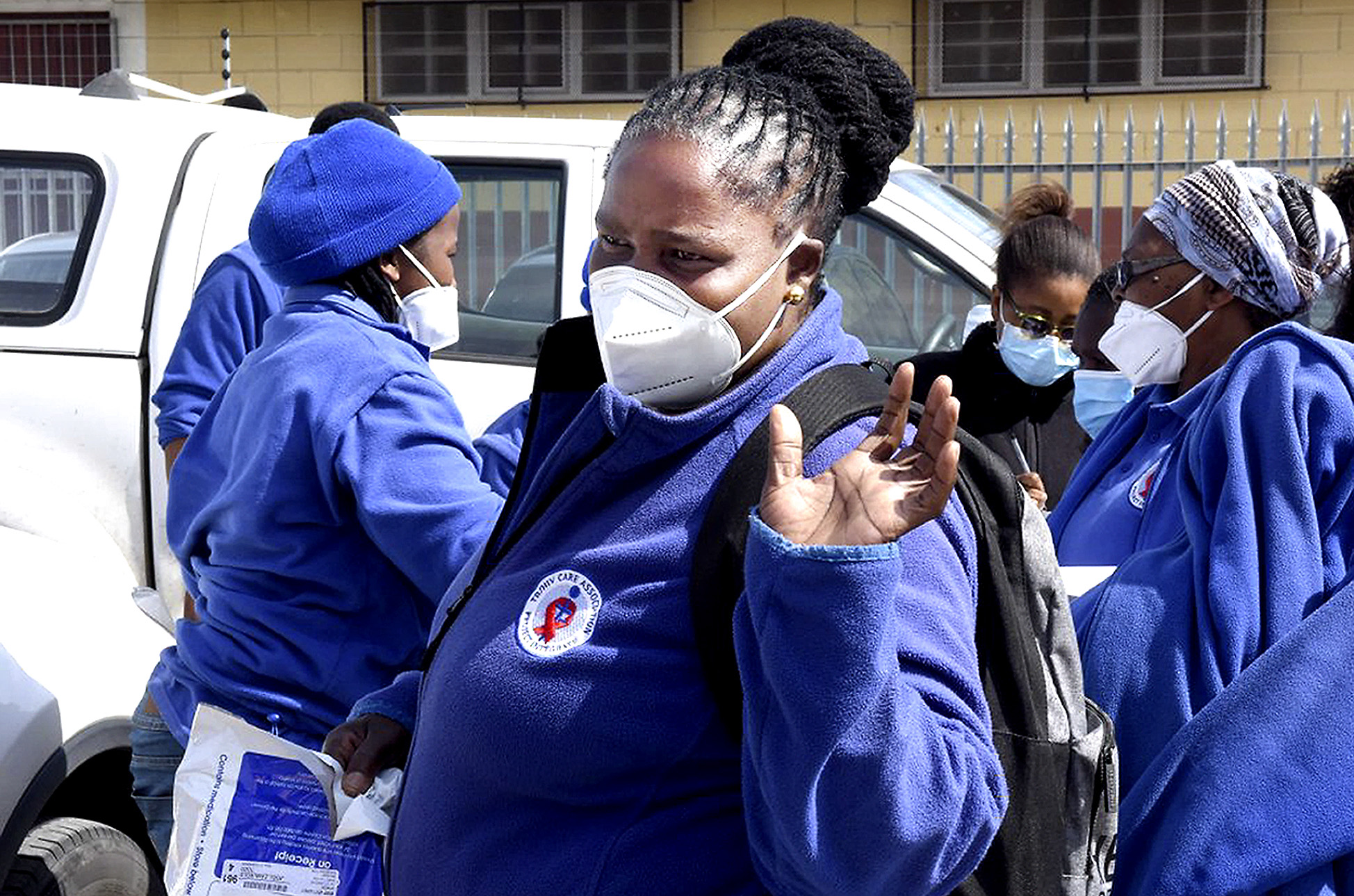
Veronica Samuel from Makhaza has lost two close relatives to Covid-19.( Photo: Nasief Manie / Spotlight)
Veronica Samuel, from Makhaza in Khayelitsha, who works for the NGO TB/HIV Care, says she has lost two relatives to Covid-19.
“We keep raising the alarm, but people don’t want to listen. Unless it kills someone close to you, then it is just a joke,” says Samuel. DM/MC
This article was produced by Spotlight – health journalism in the public interest. Sign up for our newsletter.
"Information pertaining to Covid-19, vaccines, how to control the spread of the virus and potential treatments is ever-changing. Under the South African Disaster Management Act Regulation 11(5)(c) it is prohibited to publish information through any medium with the intention to deceive people on government measures to address COVID-19. We are therefore disabling the comment section on this article in order to protect both the commenting member and ourselves from potential liability. Should you have additional information that you think we should know, please email [email protected]"





 Become an Insider
Become an Insider